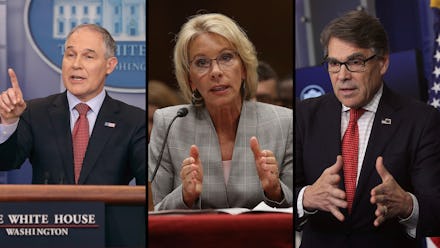While You Weren’t Looking: 5 stories from Trump’s Cabinet that don’t involve Russia or the DNC

In a wild week of news that included the indictment of several Trump campaign officials, a deadly terror attack in New York City, the release of the Republican Party’s new tax plan and damning revelations about the Democratic National Committee’s handling of the 2016 presidential primary elections, a lot of important policy news went untouched.
Here’s what you may have missed.
Scott Pruitt bars key scientists from the EPA’s scientific advisory committee
Environmental Protection Agency administrator Scott Pruitt issued new rules for who can advise the agency on its research and regulation policies, barring certain scientists from weighing in and creating openings for more industry input.
The new rules bar scientists who receive EPA funding from belonging to any of the agency’s top advisory boards. While Pruitt claimed the move is intended to avoid conflicts of interests, advocates argued it will stifle important scientific input.
On Friday, their fears were confirmed when Pruitt appointed several representatives from regulated industries to represent those same boards.
Pruitt cited scripture in his announcement of the new rules, saying “Joshua says to the people of Israel: Choose this day whom you are going to serve.”
Rick Perry implies fossil fuels could reduce sexual assault
Energy Secretary Rick Perry has come under fire for comments he made Thursday that suggested fossil fuels could somehow prevent sexual assault.
“But also from the standpoint of sexual assault, when the lights are on, when you have light that shines, the righteousness, if you will, on those types of acts,” Perry said at an energy event in Washington, D.C. “So from the standpoint of how you really affect people’s lives, fossil fuels is going to play a role in that. I happen to think it’s going to play a positive role.”
Environmental advocacy groups responded with outrage over the comments. Michael Brune, executive director of the environmental nonprofit the Sierra Club, called on Perry to resign, claiming he was trying to “exploit this struggle to justify further dangerous fossil fuel development.”
Betsy DeVos’ family violates pledge to end political donations
During her confirmation hearings, Education Secretary Betsy DeVos promised to end her family’s longtime practice of influencing policy through political donations during her tenure.
But Detroit News reported Monday that DeVos’ husband has continued donating to several political action committees since her confirmation.
In a letter to DeVos’ office demanding an explanation, Sen. Patty Murray (D-Wash.) told DeVos she was “concerned that you, your husband and your extended family continue to utilize your vast wealth to influence and impose your agenda on a political system in which you already wield power as the secretary of education.”
A spokesperson for DeVos’ husband later claimed the donations did not violate the pledge because they had not gone to federal candidates.
Trump nominates a new Federal Reserve chair
President Donald Trump announced Thursday his nomination of Jerome Powell to lead the U.S. Federal Reserve.
Powell is a longtime member of the central banking system’s board of governors and was the expected choice to replace sitting chair Janet Yellen. His selection implies the Trump administration does not intend to make drastic changes to U.S. monetary policy: As a member of the board of governors, Powell has mostly voted in line with Yellen, suggesting he will continue her policies after her tenure.
The decision to replace Yellen with someone who shares her policy positions is abnormal. Federal Reserve chairs are often reappointed from one administration to the next, in part to avoid roiling the markets. Trump’s move appears to be based more on the politics of replacing Obama-era officials than it is on actual policy concerns, especially given current stock market highs.
Trump reconsiders ban on uranium mining in the Grand Canyon
Trump is reportedly reconsidering an Obama-era ban on uranium mining in the Grand Canyon.
The rule has been placed on a list of existing policies the U.S. Forest Service claims hinder the production and use of domestic energy. The Obama administration first implemented the ban in 2012 after environmentalists and indigenous tribes raised concerns that such mining could irrevocably pollute the nearby Colorado River.
Interior Secretary Ryan Zinke criticized the ban in June, claiming it inhibited “much-needed growth and jobs” in the area.